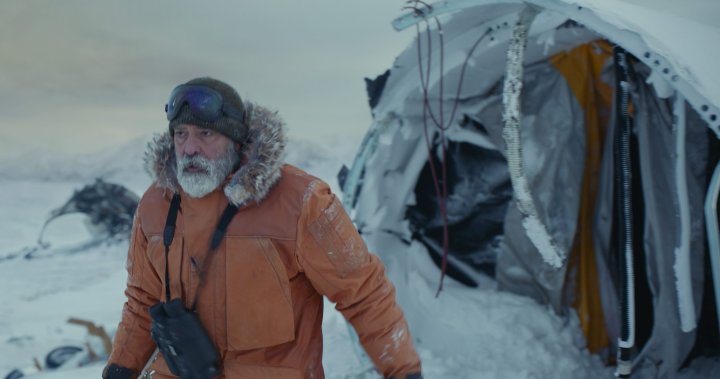It’s a feeling we’ve all become too familiar with during the coronavirus pandemic: isolation.
Even if we’re under lockdown for COVID-19 with family, roommates or a spouse, that pervasive sense of being alone in the face of a gigantic, unseen enemy has been universal for the past several months.
George Clooney‘s Netflix movie, The Midnight Sky, takes a closer look at that feeling in both a metaphorical and quite literal way. Shot pre-COVID, it’s almost prescient. Set post-apocalypse, the movie follows Augustine (Clooney), a lonely scientist in the Arctic — who doesn’t have very long to live — as he races to stop Sully (Felicity Jones) and her fellow astronauts from returning home to a mysterious global catastrophe.
Clooney directs this adaptation of Lily Brooks-Dalton’s acclaimed novel Good Morning, Midnight to varying success. While the movie has its moments of breathtaking beauty, it can be frustratingly cold and bleak, its characters devoid of magnetism. But maybe that’s a part of it: in the face of disaster, how jovial and tender-hearted would we be?
Here are five things to know about The Midnight Sky.
Yes, it’s a space movie, but it’s about far more than that
There are two distinct stories going on in The Midnight Sky: Clooney’s and Jones’. Both characters are facing a big, black void. Both are uncertain as they venture forth, one trudging towards death and the other towards life. Without spoiling, there are definite parallels between the characters, even though one is on Earth and one is hurtling through space.
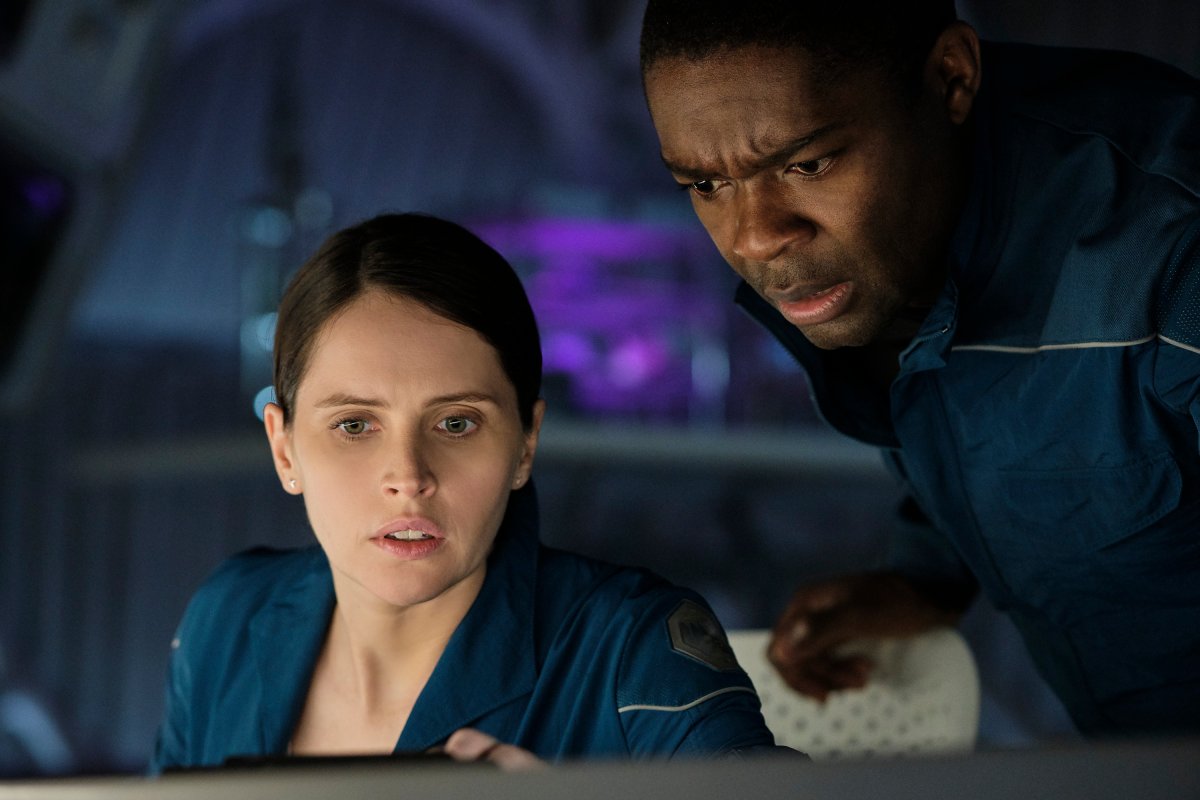
Felicity Jones and David Oyelowo star in ‘The Midnight Sky.’.
Philippe Antonello/Netflix
“When we first started talking about the film, we wanted to talk about what man is capable of doing to man and mankind,” said Clooney on a virtual media panel with the cast. “I was talking about all of the anger and hatred that’ve been playing out in our lives this year, and if you play this out for 30 years, it’s not inconceivable that [humanity would] blow it in a big way. To me, the idea was to have that conversation about what we’re capable of doing. After we finished shooting, the pandemic happened, and it became clear that the story was our desperate need to be home and close to the people we love.”
“The movie has both a macro level of being a film about some big issues, asking existential questions: the meaning of life, what are we doing here, why are we here, what do we value?” agreed Jones. “It has these broader brushstrokes, but then also this very intimate relationship drama about trying to forge connections, being family, being parents. It was also an action movie at the same time. It’s extraordinary how relevant it’s become in our current situation.”
At times, especially in space, the visuals are very impressive
It’s generally a given that movies taking place in space feature some awesome visuals. The Midnight Sky is adventurous in that sense, with many sweeping shots of our galaxy and space-porny shots of the spaceship Aether, which is a cross between an extended Enterprise and one of the rotating ships from Battlestar Galactica.
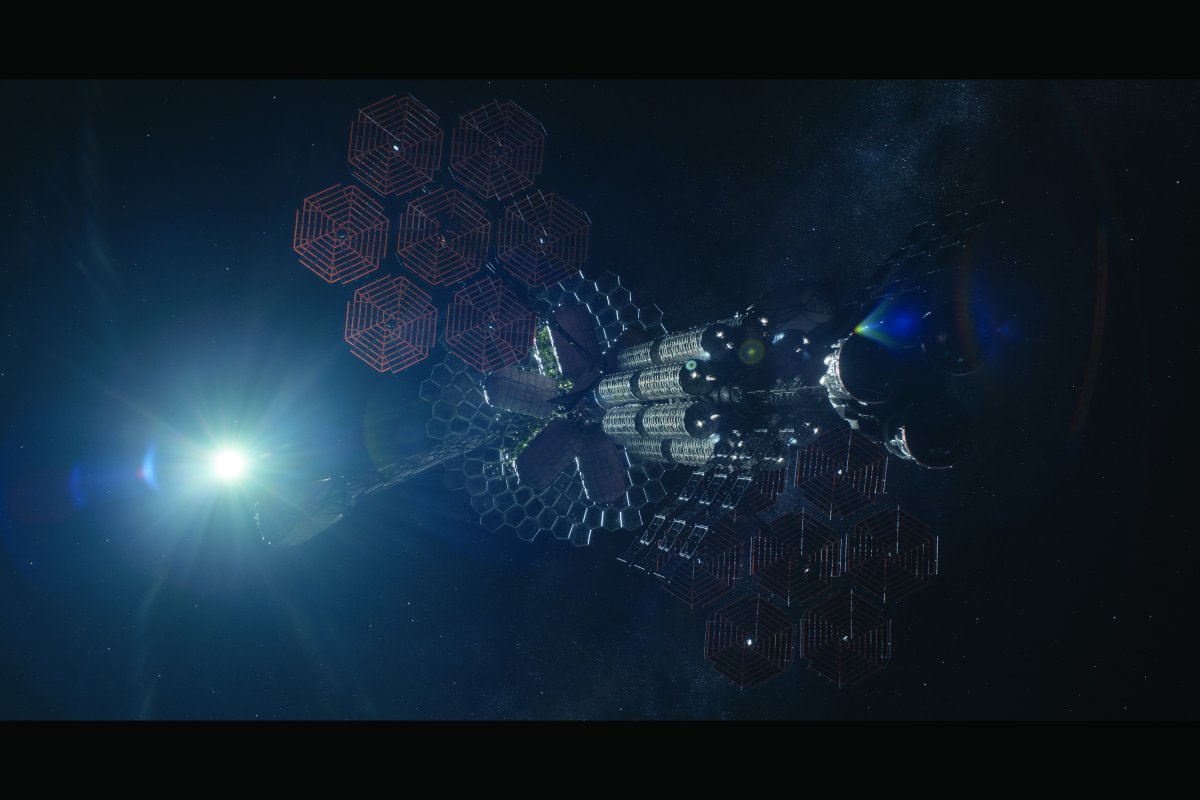
The Aether spacecraft is seen in ‘The Midnight Sky.’.
Netflix
One particularly startling image is the ship’s crew looking down on Earth following whatever cataclysmic event took place (we never find out specifically what happened). It’s hard to look at a vibrant blue Earth transformed into a dark, burning husk.
“The production design on our film is really outstanding,” said Demián Bichir, who plays Sanchez, one of the Aether crewmembers. “It’s one of the best things I’ve ever seen as an actor. It wasn’t a green screen that we were imagining, we actually saw our planet — what our planet became.”
In order to maintain sanity, the astronauts are able to summon holograms of their family and friends. Not dissimilar from Star Trek‘s Holodeck, the crew can engage with their loved ones, albeit in scripted, pre-programmed scenarios. These scenes of levity are fun in that they don’t seem far off; surely holo-friends or holo-family will become reality in the next decade.
Throughout the film, I had nagging flashbacks to Ad Astra, the 2019 space movie starring Clooney’s buddy, Brad Pitt.
Warning: There is a shocking, blood-filled scene
For the most part, The Midnight Sky is not a graphic, violent movie. One scene, however, is so jarring and disgusting it left its mark on my psyche. (It should also be noted that I am a horror junkie, and am not hypersensitive to extreme violence or gore on-screen.) It could be because the rest of the movie is so “safe” that this stood out, but it’s definitely something you don’t want your children to see.
“There was no blood there. It was all of us imagining blood,” said Tiffany Boone, whose character is at the centre of the scene. “Seeing it in the final cut is… wow. The special effects team did such a good job, I think it’s really impactful.”
“Impactful” doesn’t quite describe it, though it achieved its desired effect. Clooney said he put a lot of effort into perfecting the scene.
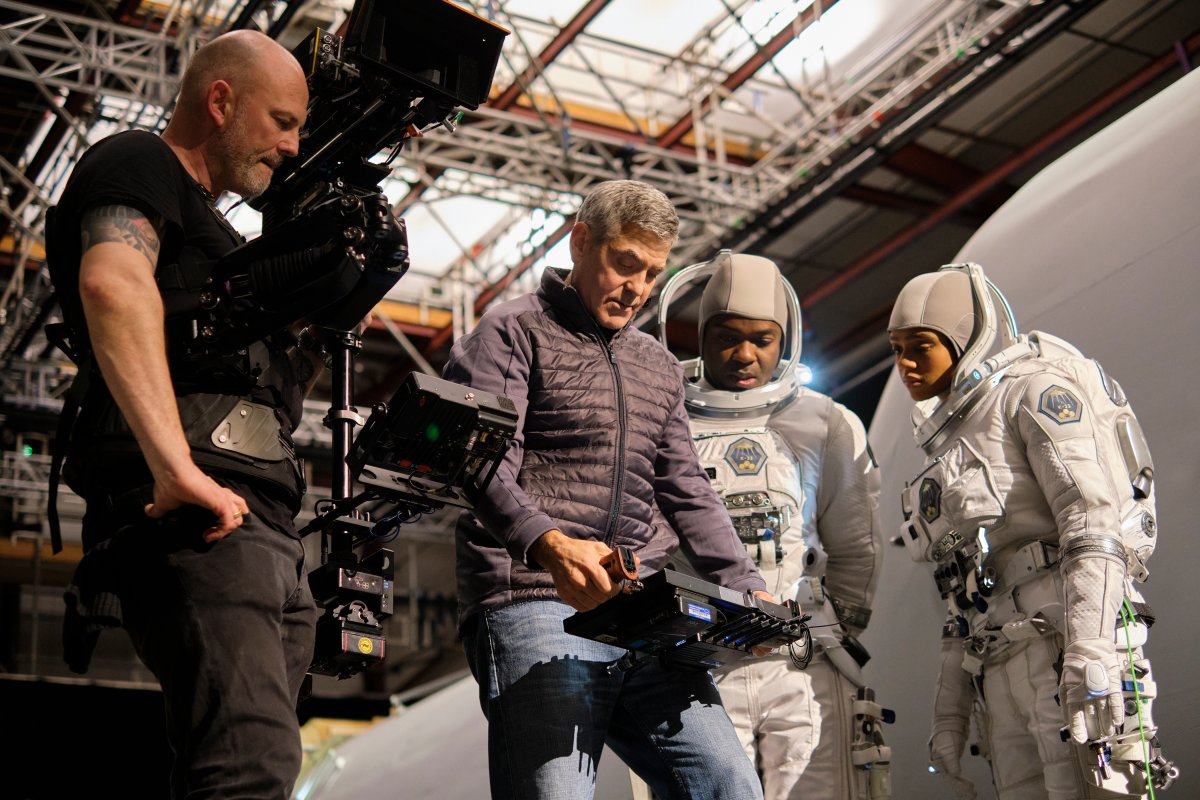
Director George Clooney on-set at Shepperton Studios with David Oyelowo and Tiffany Boone.
Philippe Antonello/Netflix
“Basically I said, I want this blood to be a ballet,” he said. “Everybody had to deal with that sequence blindly, including myself. This is about people coming to terms with life and death. Tiffany had to create this whole energy and everyone was wonderful in that sequence. She nailed it.”
It’s two movies in one
The Clooney storyline in the Arctic (actually shot in Iceland) feels perfectly remote, with what looks to be permanent blizzard conditions going on all around him at all times. Snow gathers in clumps in Augustine’s lumberjack beard, and you can feel the cold coming through the screen.
It really feels lonely, too, echoing the loneliness we’ve all felt during COVID-19 lockdowns. Is there anything more isolating than eating a meal alone in a gigantic, empty cafeteria? Every clink of a fork on a plate is deafening, your own sipping on a hot beverage rattling your skull.
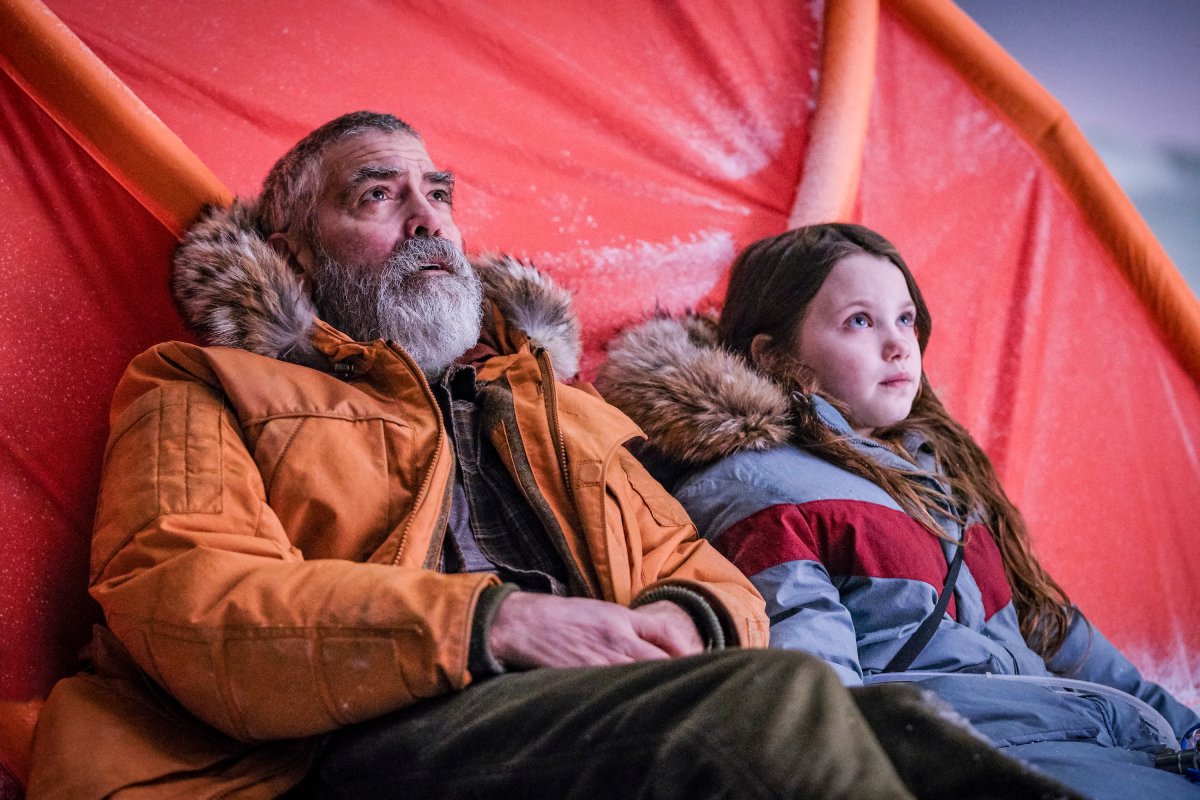
George Clooney and Caoilinn Springall star in ‘The Midnight Sky.’.
Netflix
A little girl (seven-year-old Caoilinn Springall) joins Augustine’s isolation, but she doesn’t speak. Over the course of the movie, she becomes Augustine’s outlet for emotion, and he becomes more and more attached as he gets closer to death.
The Arctic storyline and the space storyline have similar elements, but the movie feels starkly divided, held together by a very tenuous thread.
“It was like doing The Revenant for the first half, and then Gravity for the second half,” quipped Clooney.
He gave it his all for the Arctic storyline, apparently developing pancreatitis and needing hospitalization due to his rapid weight loss.
Despite all the darkness, the movie does manage to have some warmth
Felicity Jones’ real-life pregnancy changed the vibe of the movie, agreed the majority of the cast. As Jones was cast prior to the knowledge that she was pregnant, it wasn’t expected.
Concerned about Clooney’s reaction, Jones had to work up the courage to let him know. In the end, Clooney was thrilled about the news and it ended up having a positive effect on shooting — and became an important part of the story.

Felicity Jones as Sully and David Oyelowo as Commander Tom Adewole in ‘The Midnight Sky.’.
Philippe Antonello/Netflix
“It was a great relief when George made it the most encouraging … he made me comfortable the whole way through,” said Jones. “It’s a testament to his modernity to accept what was happening as opposed to running away from it. A pregnant woman in space is quite extraordinary.”
Jones’ unborn child even became a symbol of hope, something to work toward and protect, for both the Aether crew and the real-life cast.
“Redemption is a big, important thing that washes over us, and gives us hope,” said Clooney. “I found it to be a very hopeful film. We all felt like Felicity and what she was going through were our responsibility as well. It drew everybody together.”
—
‘Midnight Sky’ will be available to watch on Netflix on Dec. 23, 2020.
© 2020 Global News, a division of Corus Entertainment Inc.
